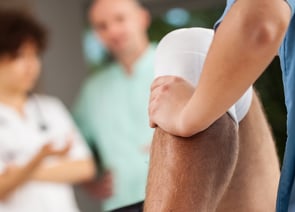 If joint replacement surgery has been recommended for you as a means of relieving the pain and debility caused by a diseased or damaged knee joint, there are a few things you should know in order to be well-prepared for your procedure. Among the more important of these is that knee replacement has very high success rates, resulting in better mobility and less pain for the vast majority of patients. However, those benefits are not instant—they will emerge gradually over several months of recovery and rehabilitation. Here, we'll go over 3 common issues that you can expect to face as you work to recover and rehabilitate after your knee replacement surgery.
If joint replacement surgery has been recommended for you as a means of relieving the pain and debility caused by a diseased or damaged knee joint, there are a few things you should know in order to be well-prepared for your procedure. Among the more important of these is that knee replacement has very high success rates, resulting in better mobility and less pain for the vast majority of patients. However, those benefits are not instant—they will emerge gradually over several months of recovery and rehabilitation. Here, we'll go over 3 common issues that you can expect to face as you work to recover and rehabilitate after your knee replacement surgery.
Pain, Stiffness, and Swelling
Joint replacement surgery is meant to relieve chronic pain, stiffness, and swelling in your affected knee. However, the trauma that surgery will inflict on the bones, muscles, and connective tissues surrounding your artificial joint means that these symptoms will get worse before they get better. As your body begins to heal and you start to restore strength and function in those affected tissues via rehabilitation therapy, they will gradually resolve themselves. Patients can generally expect to see a great deal of improvement in pain, stiffness, and swelling within the first 6 to 8 weeks after surgery, although maximum relief may take as long as 6 to 12 months.
Activity/Movement Restrictions
Your healthcare team will outline a number of restrictions that you will need to observe carefully to ensure against damage to your new joint and surrounding tissues. These will be most stringent during the initial 6 to 8 weeks after surgery. For instance, you will be instructed to avoid pivoting on or twisting your knee during this period. Kneeling and squatting will also be off limits. You will not be able to drive right after surgery, and there generally are limitations as to how much weight can be placed on the affected joint. These restrictions will be lifted gradually as you progress through the process of recovery and rehabilitation.
Mobility Issues
Mobility is another issue that will get worse before it gets better. Immediately after surgery, you can expect to be dependent on walking aids. Most patients start out with a walker right after surgery, then may graduate to crutches and/or canes as they progress through the recovery and rehabilitation process. That means getting around will be hard work for a while, especially during the first couple of weeks after surgery, and you can expect to need some help with household tasks, such as cooking and cleaning, as well as with shopping and other errands.
While the prospect of dealing with these issues may be rather daunting, the fact is that for millions of patients who have undergone joint replacement, the benefits of that new knee joint are well worth the difficulties of the post-surgery recovery and rehabilitation process. An important thing to remember as you go through that process is that a strong commitment to rehabilitation therapy can help speed it along. For that reason, you may want to consider a stay in an inpatient short-term rehab program after surgery, an option that can offer the intensive rehabilitation therapy and treatment you need to regain your strength and independence as quickly as possible.





